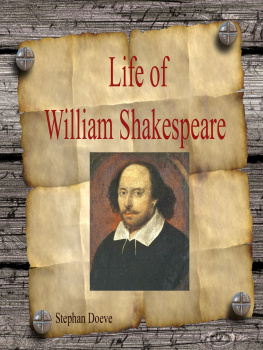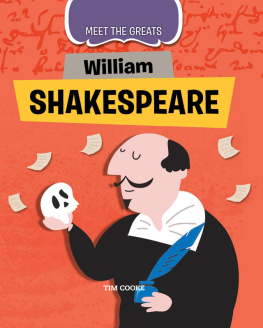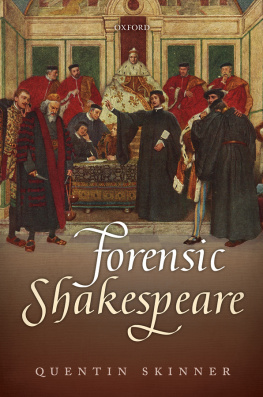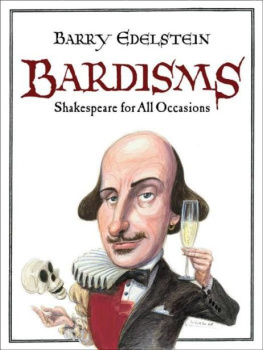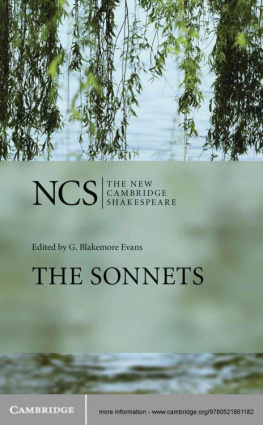Stephan Doeve - Life of William Shakespeare
Here you can read online Stephan Doeve - Life of William Shakespeare full text of the book (entire story) in english for free. Download pdf and epub, get meaning, cover and reviews about this ebook. year: 2014, publisher: BoD E-Short, genre: Detective and thriller. Description of the work, (preface) as well as reviews are available. Best literature library LitArk.com created for fans of good reading and offers a wide selection of genres:
Romance novel
Science fiction
Adventure
Detective
Science
History
Home and family
Prose
Art
Politics
Computer
Non-fiction
Religion
Business
Children
Humor
Choose a favorite category and find really read worthwhile books. Enjoy immersion in the world of imagination, feel the emotions of the characters or learn something new for yourself, make an fascinating discovery.
- Book:Life of William Shakespeare
- Author:
- Publisher:BoD E-Short
- Genre:
- Year:2014
- Rating:3 / 5
- Favourites:Add to favourites
- Your mark:
- 60
- 1
- 2
- 3
- 4
- 5
Life of William Shakespeare: summary, description and annotation
We offer to read an annotation, description, summary or preface (depends on what the author of the book "Life of William Shakespeare" wrote himself). If you haven't found the necessary information about the book — write in the comments, we will try to find it.
Life of William Shakespeare — read online for free the complete book (whole text) full work
Below is the text of the book, divided by pages. System saving the place of the last page read, allows you to conveniently read the book "Life of William Shakespeare" online for free, without having to search again every time where you left off. Put a bookmark, and you can go to the page where you finished reading at any time.
Font size:
Interval:
Bookmark:
This biography of William Shakespeare is by Frederic W. Moorman.(18721918). Assistant Professor in the University of Leeds.
The painstaking research of two centuries has not yet succeededin removing all the difculties which the student encountersin attempting to decipher the life of Shakespeare. We know more ofChaucer, who died more than a hundred and fty years beforeShakespeare was born, and infinitely more of Milton, who waseight years old at thetime of Shakespeares death. Thiscomparative lack of knowledge as to the life and character of thegreat dramatist is, to some extent at least, explicable. Thesocial status of an Elizabethan dramatist was by no means a highone, and compares, indeed, very unfavourably with that of apoet of the same period. The playwright, like the actor, couldnever wholly remove the odour of ill-fame which clung to hiscalling in a country where Puritanism was an ever-growing force.Had Shakespeare been primarily a poet, and had he remainedcontent to produce poems after the fashion Venus and Adonis insteadof plays like Hamlet, his reputation in his own day would certainlyhave been greater among those of his countrymen with whom reputation was in safe keeping, and a more exact knowledge of theevents of his life would have been transmitted to posterity. As itwas, he had to wait until the year 1709 for his rst biographer.Where exact knowledge has been wanting, conjecture has been rife;and the rst task of the sober modern biographer of Shakespeare isto remove the many guesses after truth and the after-math ofdubious aneedotage which, so far from bringing the real man nearerto us, serve only to obscure our view of him. Our comparative lackof knowledge can be traced to yet another cause. The reason why thepersonality of Chaucer is so familiar to us is that the poet loveddearly to talk about himself in his works. lt is extremely doubtfulwhether Shakespeare did this, outside of his Sonnets. As adramatist he stands aloof from his work; selfeffacement seems to behis abiding purpose, and the many attempts which modernShakespearean critics have made to nd in the speeches of hischaracters a direct echo of the dramatist's own sentiments andthoughts are always hazardous, and often misleading. The gudingprinciple of the following short biographical sketch has,accordingly, been one which, laying little weight upon surmise andconjecture, adheres closely to denitely established facts.William Shakespeare was born at Stratford-on-Avon on April 22 or23, 1564. His father, ]ohn Shakespeare, had been carrying onbusiness in that town since about 1551; he seems to have been ageneral trader in farm produce, such as corn, meat and skins, andbecame in time one of the most inuential citizens of Stratford. In1557 he married Mary Arden, who, though unable to write her name,belonged to a Warwickshire family of some distinction, andbroughtto her husband a substantial dowry. The poet was the eldest oftheir children who outlived infancy. When about seven years of age,he became a scholar at the Stratford Grammar School, where freeeducation was imparted to the boys of the town. Much has beenwritten at different times with regard to the extent ofShakespeares scholarship. Ben Jonson, his friend andfellow-dramatist, speaks slightingly of his small Latin andless Greek", and the assumption has been made that he knew nolanguage but his own. This however, is not true. As aschool-boy, he must have received instruction in the Latinlanguage and literature, while some of his plays bear witnessto the fact that he was able to read French and Italian. Atthe same time, it would be a mistake to regard him as a greatlinguistic scholar..We know that he read his Plutarch in theEnglish translation of North, and that when, he drew his plots fromFrench or Italian sources, he had recourse to an Englishtranslation, wherever such was to be had. Shakespeare was first ofall a student of humanity; next, a student of nature; so thatbook-learning could claim only a third place in his esteem. Duringhis years of boyhood at Stratford, humanity probably appealed tohim less strongly than external nature. His plays furnish abundantproof as to the ne training of his eye and ear for the sights andsounds of the countryside, and this training must have been largelygained before his settlement in London.
While Shakespeare was still a boy, his father's nancial and socialposition had suffered change. He had long taken an active interestin municipal affairs, and in 1571 he held the ofce of chiefalderman of Stratford; but shortly after this, he fell heavily intodebt, was forced to mortgage a good deal of his property, and in1586 was deprived of his aldermans gown. This change of fortuneaffected the son as well as the father. The former was removedearly from school, probably in 1577, and, if tradition speak true,came to the help of his father in his business.
We hear nothing more of him till the year 1582, when, at the age ofeighteen, he married Anne Hathaway, the daughter of a husbandman atthe neighbouring village of Shottery, and nearly eight years olderthan himself. Between 1583 and 1585, two daughters and a son wereborn, and these constituted the whole of his family. About theyear 1586, he left wife and children behind him and set out forLondon. A tradition, which is, perhaps, supported by theJustice Shallow scenes in The Merry Wives of Windsor,declares that he was forced to leave Stratford because of thepart which he had taken in a deer-stealing raid on the estate ofSir Thomas Lucy, who was afterwards caricatured as Justice Shallow.While complete certainty on this point cannot be obtained, a gooddeal ean be said for the story. If true, the consequences of thisescapade were indeed far-reaching. On his arrival in London, heseems to have turned his steps toward the theatres. The companywith which he was all through his life most closely associated wasthe Lord Chamberlain's Company, which acted at rst at The Theatre,Shoreditch, and after 1599 at the Globe Theatre, on the south bankof the Thames. At rst Shakespeares connection with the theatrewas most probably of a very humble nature, but his genius calledeloquently for that advancement in position which should give itfree play, and by the year 1590, at the latest, we nd him engagedin dramatic work. Like other dramatists of the time, and likeMolire, he sought to combine the work of actor and playwright: weknow that he acted in some of his own plays, and in those of BenJonson, but the roles which tradition associates with his name -the Ghost in Hamlet, and Adam in As You Likeit--suggest that he never became an actor of the rst rank. Histrue eld of work lay elsewhere - in the creation rather than inthe personation of great characters. When his dramatic powers wererst recognised by his company, he was set to revise old plays, ornew plays which needed alteration.
From such revision, he soon passed to independent authorship, andfrom 1591 onwards to 1611, his genius knew no respite. Playfollowed play in quick succession, new elds of dramatic work wereopened up, new phases of humanity were studied, and life in itssplendour and its misery, its humour and its pathos, its greatnessand its littleness, passed before the dramatist's scrutinisinggaze. The versatility of Shakespeares genius is manifest from theoutset. Instead of conning himself, like Marlowe, hispredecessor, mainly to one eld of drama, he essayed all.During his rst years of authorship, he wrote such playsas Love's Labour's Lost, The Two Gentlemen of Verona,The Comedy of Errors, Romeo andJuliet ( first draft) Richard II, Richard III, The Merchant of Venice and AMidsummer Night's dream. Of these, the rst two may betermed romantic comedies, the third is a farce, the fourth atragedy of love; the fth and sixth are history-plays, the seventha comedy of a serious, and at times even tragic aspect, and thelast an exquisite lyrical fantasia, weighted with farcicalburlesque.
Font size:
Interval:
Bookmark:
Similar books «Life of William Shakespeare»
Look at similar books to Life of William Shakespeare. We have selected literature similar in name and meaning in the hope of providing readers with more options to find new, interesting, not yet read works.
Discussion, reviews of the book Life of William Shakespeare and just readers' own opinions. Leave your comments, write what you think about the work, its meaning or the main characters. Specify what exactly you liked and what you didn't like, and why you think so.

